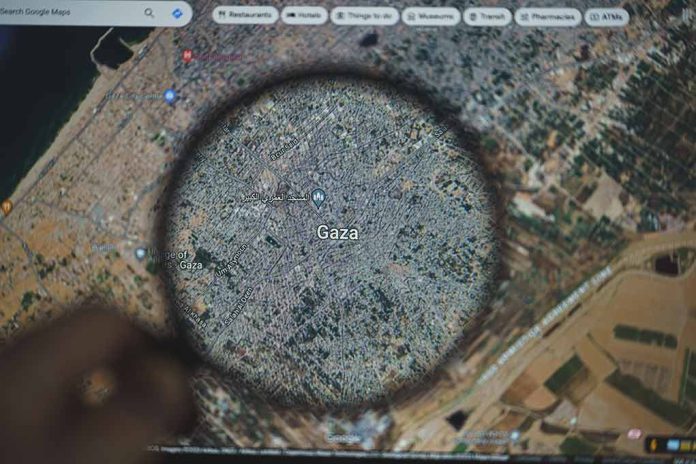
Israel offers Hamas leaders safe passage in exchange for hostage release and Gaza’s demilitarization, potentially ending the ongoing conflict.
At a Glance
- Israel proposes deal to end Gaza war, offering Hamas leader Yahya Sinwar safe passage
- Proposal includes immediate release of 101 hostages and Gaza’s demilitarization
- Hamas politburo member Ghazi Hamad swiftly rejected the offer
- Hostage families support the proposal, urging government backing
- Rising tensions with Hezbollah pressure Israel to conclude Gaza conflict
Israel’s Bold Proposal to End Gaza Conflict
In a significant shift from its previous stance, Israel has proposed a comprehensive deal to Hamas aimed at ending the war in Gaza. The offer includes safe passage for Hamas leader Yahya Sinwar in exchange for the immediate release of all 101 hostages, the demilitarization of Gaza, and the establishment of a new governance structure in the region. This proposal marks a departure from Prime Minister Netanyahu’s earlier position of continuing the fight until Hamas is completely destroyed.
The proposal was confirmed by an Israeli official and has been presented to American officials for relay to Arab counterparts. It represents a secondary track alongside the main talks mediated by the United States, Egypt, and Qatar. The plan aims to alleviate both domestic and international pressure on Israel while allowing the country to shift its focus to the growing threat from Hezbollah in Lebanon.
Hamas Response and Negotiations
Despite the potential for a breakthrough, Hamas has initially rebuffed Israel’s offer. Hamas politburo member Ghazi Hamad quickly dismissed the proposal, highlighting the challenges that remain in reaching a resolution.
The rejection underscores the complexity of the negotiations and the deep-rooted issues that continue to impede progress. Israel’s hostage envoy, Gal Hirsch, who made the offer, emphasized that Hamas has been dictating terms rather than negotiating in good faith. This standoff highlights the urgent need for a breakthrough in the talks.
Domestic and International Pressures
The proposal comes amid mounting pressure on the Israeli government from various fronts. Families of the hostages have voiced their support for the deal, urging the government to publicly back it. This support reflects the growing desperation among Israelis to see their loved ones returned safely.
Internationally, the United States, Qatar, and Egypt are working on a new ceasefire proposal for Israel, indicating the global community’s involvement in seeking a resolution. Secretary of State Antony Blinken has emphasized the urgency of the situation and the need for leaders to make decisive decisions.
Challenges and Future Implications
While the proposal offers a potential path to ending the conflict, it faces several challenges. Prime Minister Netanyahu’s hard-right coalition allies may push back against the plan, viewing it as too conciliatory. Additionally, there are doubts about Hamas accepting the offer, given Israel’s history of targeting operatives abroad.
“The prime minister spoke about this in [his speech to] Congress. He said that the war could end now if Sinwar is exiled, we get the hostages, Hamas is not in power, and there is demilitarization and deradicalization. This means victory, and the end of the war,” the official said.
The proposal’s success could have far-reaching implications for the region. It could pave the way for a new governance structure in Gaza and potentially reshape the dynamics of the Israeli-Palestinian conflict. However, the implementation of such a plan would require overcoming significant obstacles and gaining support from various stakeholders in the region.








